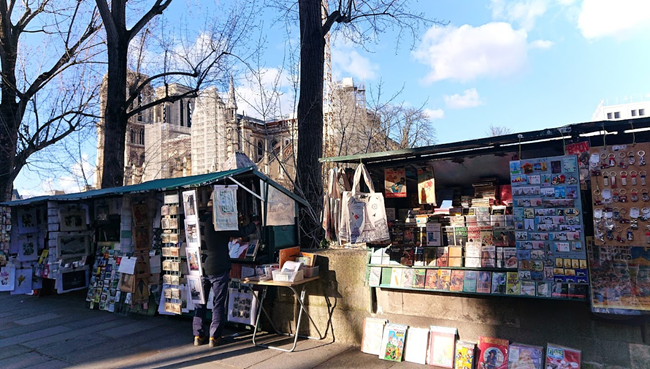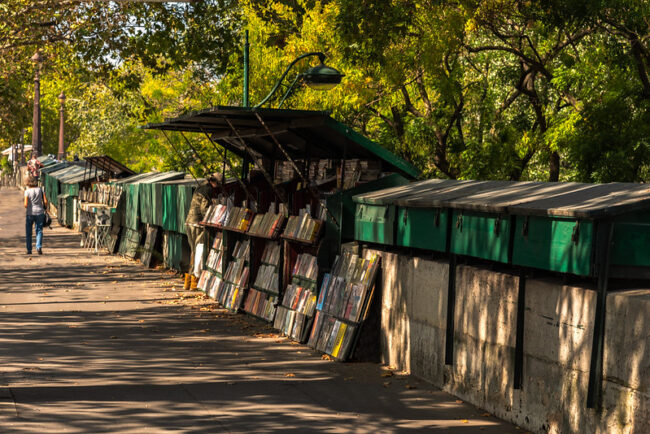Les Bouquinistes: A History of the Beloved Booksellers on the Seine
The city of Paris is buzzing as the city prepares for the Olympics which commence July 26, but it hasn’t been smooth sailing for everyone involved in the lead-up to the Olympic Games – particularly for second-hand Paris booksellers, les bouquinistes, who operate in bookstalls along the Seine.
Originally, there was talk of the famous green bookstalls being removed from along the Seine in advance of the opening ceremony, which is projected to bring 600,000 spectators to the city for the opening events. The Paris prefecture worried that the bookstalls could be used to hide explosives during the Olympics.
President Emmanuel Macron stepped into the debate this month and declared that the bouquinistes can stay in their regular location during the Olympics. This is a relief to many, particularly those who feared that the removal of the bookstalls could cause irreversible damage to the green boxes, some of which have been there for over a century.
John Paul Fortney, an importer of French wines who lived in Paris for over a decade, tells Bonjour Paris, “It’s hard to imagine walking in Paris by the Seine without the bouquinistes. I’m glad that their value and importance is being recognized as Paris prepares for the Olympics.”
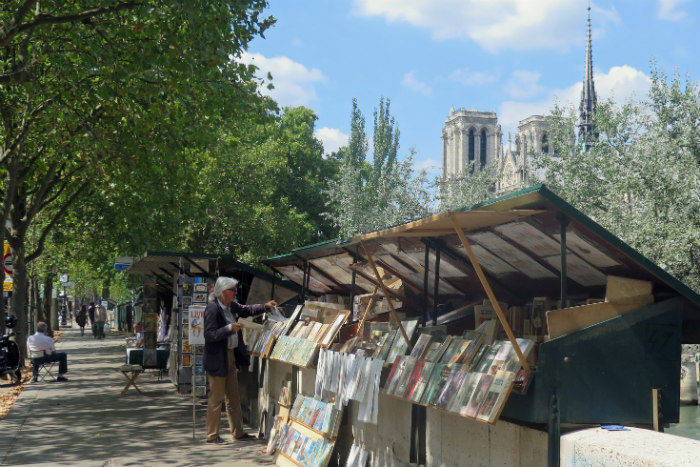
The bouquinistes of Paris. Photo credit: Peter Olson
Les Bouqinistes & The Olympics
As a result of Olympics preparations, the bouquinistes along the banks of the Seine found themselves at the heart of a controversy over whether they could stay or go during the Summer Olympic Games in Paris.
Amusingly, the head of the Cultural Association of Booksellers in Paris, Jérôme Callais (who has been selling books from the green bookstalls since the 1990s), compared the efforts to remove the bouquinistes to a “tooth extraction.” (Read the Bonjour Paris profile and illustration of Jérôme Callais here.)
Callais was cited in an Associated Press article speaking on the efforts to remove the booksellers, saying, “It’s as if the prefecture decided that the Eiffel Tower was too high and that the third and second floors had to be removed because they came within the scope of the cameras during the ceremony.” Callais later said, “The only thing we ask is that they don’t touch our boxes…We are fragile enough as it is. We want to last a few more centuries.”
Paris’s city hall did, however, say it would renovate the bookstalls for free after their removal, but Callais and other members of the booksellers’ association weren’t interested in the offer. The booksellers’ association offered that the bookstalls could be sealed up during the ceremony to enhance safety measures during the Olympic Games.
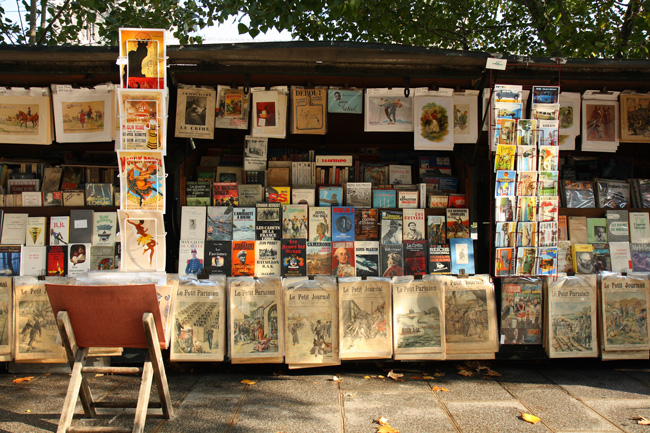
A bouquiniste on the Quai de Montebello. Credit: Benh LIEU SONG/ Wikimedia commons
The History of The Bouquinistes
During the booksellers’ association’s plight to keep the bookstalls for the Olympics, it was cited how, during Queen Elizabeth II’s first royal visit to Paris, in 1957, all the bouquinistes stayed in their location along the Seine.
This is one of countless examples of how the bouquinistes are a fixture of Parisian culture. The bouquinistes are also part of a UNESCO World Heritage Site. And the approximately 900 green bookstalls, which hold over 300,000 books and newspapers and Paris memorabilia, are emblematic of Paris in many ways.
The tradition of second-hand bookselling reportedly began in the 16th century in Paris, and it used to be done on bridges. A 1649 settlement in Paris banned the stalls on Pont Neuf, so the booksellers were driven out and then could set up shop again after receiving approval.
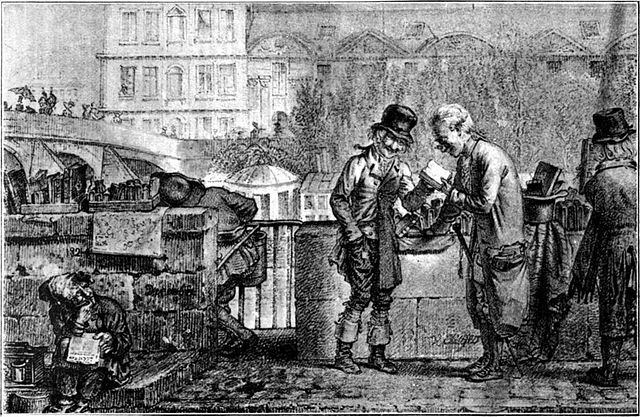
Engraving by Jean Henry Marlet after Adrien Victor Auger, Bouquiniste quai Voltaire 1821. From Wikimedia Commons
The bouquinistes are found on both the left and right banks of the Seine, and they stretch out along the river for nearly two miles. The Seine was once described by a BBC Radio 4 reporter (for “The Paris Bouquinistes” program) as “the only river in the world that runs between two bookshelves.”
As Peter Olson wrote for Bonjour Paris in 2015, this tradition of selling second-hand books in Paris is several centuries old. “However, it originally met a lot of resistance, especially as the authorities had a difficult time enforcing the then-prevailing censorship rules (like during the Nazi occupation of the city).”
The word “bouquiniste” was in L’Académie française dictionary as early as 1762, writes Olson. And in 1859, a set of rules for the booksellers was officially established, and bouquinistes were allowed to establish their bookstalls at fixed points that meant certain requirements. In 1930, the dimensions of the bookstalls became regulated and a fixed condition of operating the bookstall. Today, bouquinistes must file an application to be granted the right to sell from one of these green stalls.
Like any long-surviving underdog, the bouquinistes have endured other hardships before; the Olympics is not their first rodeo, so to speak. In the 1970s, the bouquinistes reportedly felt threatened by the Voie Express Rive Gauche’s construction, alongside Parisians’ increased interest in TV, film, and radio (over books).
President François Mitterrand (who was in office May 1981 – May 1995) was a notable fan and supporter of the bouquinistes.
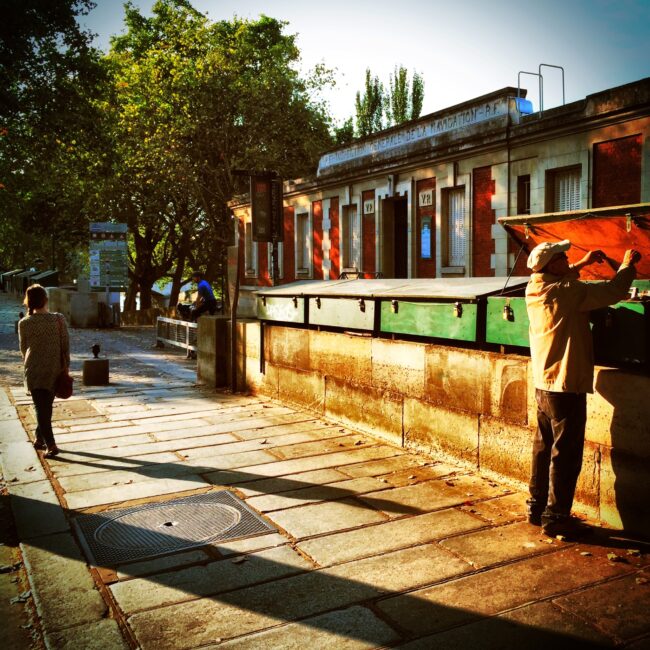
A bookseller closes his box for the day. Photo credit: Simon Jowett/ Wikimedia commons
Why They Are So Beloved
After the ruling by Macron that the booksellers could stay during the Olympics, a flurry of activity on X (formerly Twitter) praised the decision.
Paris-based writer at The Guardian, Jon Henley, writes of the decision, “common sense prevails.” Funny comics emerged highlighting this victory for the booksellers, with one showing an Olympics-style podium and a bouquiniste in the number one victor position.
Many people noted how the bouquinistes are so ingrained in Paris culture. X (Twitter) user Aida B writes, “[translated from French] It is difficult to imagine the banks of the Seine without second-hand booksellers; it amounts to destroying the soul of Paris. With the millions of visitors expected in Paris during the Games, the absence of these emblematic wooden wagon boxes would have been a green stain…”
And French engineer Pierre Nverval writes on X of the news that the booksellers can stay, saying, “[translated from French] The Booksellers of Paris. Happy, light, you could almost hear them whistling!” Philippe Robine writes on X, “The Bouquinistes des Quais de Paris 2 A huge thank you from the bottom of our hearts to everyone who supported us during these seven months of battle! THANK YOU!!!.”
It’s said that the smallest dog barks the loudest. And the Olympics-spurred battle of the bouquinistes is a lovely reminder of how underdogs of the world tend to rise and prevail. Reminiscent of the “David versus Goliath” story, the bouquinistes may not be the strongest or the best-looking or have the most resources, but they have a centuries-old history of survivorship, the spirit of a lion, and a whole lot of heart. What’s more Parisian than that?
Lead photo credit : Photo Credit: Les Bouquinistes/Google Image
More in books, Bouquinistes, French books, Olympics
